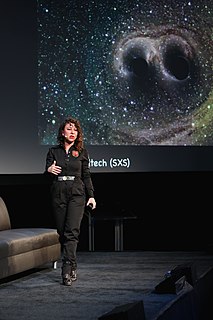A Quote by Michio Kaku
A lot of the things you see in science fiction revolve around black holes because black holes are strong enough to rip the fabric of space and time.
Related Quotes
Black holes provide theoreticians with an important theoretical laboratory to test ideas. Conditions within a black hole are so extreme, that by analyzing aspects of black holes we see space and time in an exotic environment, one that has shed important, and sometimes perplexing, new light on their fundamental nature.
I like science fiction and physics, things like that. Planets being sucked into black holes, and the various vortexes that create possibility, and what happens on the other side of the black hole. To me it's the microcosmic study of the macrocosmic universe in man, and that's why I'm attracted to it.






























